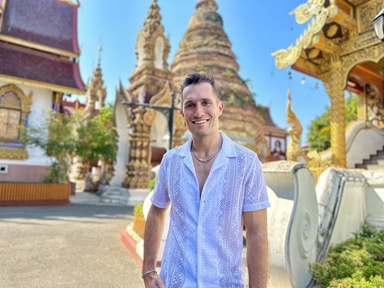
Nathen Spitz is from Osage, Iowa. He hopes to match in psychiatry on Friday, March 17.
What made you want to be a physician?
I was always an inquisitive, curious kid. Then on my first day of middle school, we had our first family meeting, and my life and career trajectory were forever changed. My mom was diagnosed with Stage III thymic carcinoma. She ended up passing away when I was 13 years old after a two-and-a-half-year battle with cancer.
While my mom was sick, nobody really talked to me about the emotional aspect of what we were all experiencing. I had shoved all the pain down, and I was also struggling to come to terms with my sexuality as a gay person. It took several office visits crying out for help before I was referred to get help with my mental health, and at that point, the nearest child and adolescent psychiatrist was hours away, with a months-long waiting list.
My personal experience battling the stigma of mental health disorders, as well as the lack of access to mental health services I experienced in my small town, really catapulted me into pursuing health care as a profession. I made a promise to my mom and myself that I would try to give back so that other people struggling with their mental health didn’t feel as alone as I did.
What academic or extracurricular experiences most shaped your time in medical school?
I was lucky to find Dr. Nicholas Trapp my first semester of medical school and work on several projects with his team. Together, we investigated the use of transcranial magnetic stimulation (TMS), where we use magnetic coils to excite hypoactive regions of the brain. My research in medical school compared different TMS modalities in treating depression.
Doing research in medical school really put learning into my own hands. It gave me a sense of confidence that I could ask questions, analyze data, and help improve the understanding of the mind so we can better help people who are struggling.
What is your fondest memory of medical school?
I had the honor of serving as an executive director at the Free Mental Health Clinic for several years. Helping lead our clinic through an international pandemic gave me multidisciplinary leadership experience. Working with providers, community partners, medical students, pharmacy students, social work students—they were all things that I didn't expect coming into medical school.
I'll never forget one clinic in my first year of medical school. I was feeling really disengaged from the medical school experience. I'd spent weeks in a row with my head in a book at the library, and I had just had an exam on Friday morning, and it didn't go well.
Then Saturday morning, I went to the clinic and got to meet and interview an undocumented person from Mexico and their emotional support dog. This person was isolated from their family and struggling with feeling alone here in the U.S. It was amazing to hear from them about the impact of the Free Mental Health Clinic. Needless to say, there were tears from both parties in the room.
What drew you to the specialty of psychiatry?
After my personal experience navigating the mental health care system, as well as impactful volunteer opportunities with kiddos with cancer and with LGBTQ+ teens as a mobile crisis counselor, I love that in psychiatry I get to blend my compassion and curiosity for others’ life stories with my fascination with neuroscience.
I am especially interested in child and adolescent psychiatry. Most mental health disorders reveal themselves at or before this time, so working in this space can really impact a person’s life trajectory. Plus, I think working with kids and teens is just more fun!
Update
Nathen matched in Psychiatry at Cornell.